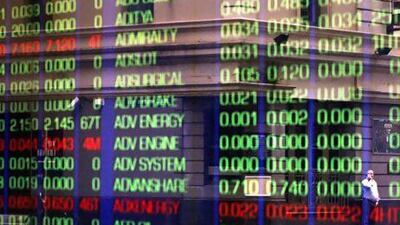Are we witnessing the death of globalisation? That spectre is raised by a hard-hitting report from McKinsey*, and the consultants make a convincing case for the imminent demise of the concept that has been at the heart of international capitalism for three decades.
In a nutshell, McKinsey's argument is this: while the world has (to some degree) shaken off the economic repercussions of the crisis of 2008-09, the financial world is still reeling from the shock waves, and may never fully recover. It may be the self-confident days of 2000-07 are gone for good.
Since the 1990s, capital markets and banking systems were on an ever-widening cycle of what McKinsey calls "financial deepening" - the expansion and diversification of financial products. That has now stalled.
Some of these products, such as collateralised debt obligations, were the instruments that sparked the crisis in 2007, so you might say "good riddance". But others, like affordable mortgages and convenient credit, were life-enhancing.
In a survey of 183 economies, McKinsey found that although global financial assets, such as equities, government and corporate bonds and bank loans, have recovered to pre-crisis levels, growth has slowed worryingly.
Cross-border capital flows, like international bank lending, foreign direct investment and equities, have also slowed to a trickle. Valued at US$11.8 trillion (Dh43.34tn) in 2007, they currently stand at more than 60 per cent below this peak.
Much of the blame goes to Europe, where financial integration has gone into reverse. Recovering cross-border activity in the rest of the world is nowhere near enough to fill the gap left by the Europeans.
Although the energy-rich GCC region is generally regarded as having come through the crisis relatively unscathed (apart from Dubai), the figures tell an equally grim story for the region.
Capital inflows to the GCC, which largely followed emerging market models before 2007, have collapsed, says McKinsey, and now stand at 10 per cent of their 2007 high. Outflows (reflecting the region's status as a capital provider to the rest of the world) have held up better, but are still 20 per cent off 2007.
Now, financial assets as a percentage of GDP in the GCC is lower than the average of all emerging markets, with especially low levels in bank loans and bonds. Overall, the picture is that Europeans have stopped lending to and investing in the rest of the world, but, perhaps frightened by the Arab Spring that came hot on the heels of the crisis, are pulling out of the Middle East in particular, even the well-capitalised GCC.
In contrast to Europe and the GCC, other emerging markets have rebounded sharply since 2008-09. Capital inflows to China, India, South East Asia and Latin America have surpassed 2007 levels.
Investment from the non-Middle East emerging markets have also recovered, with both private and sovereign wealth investors increasing their spending in the rest of the world, especially along the "south to south" axis from Asia through Africa to South America.
McKinsey sees two possible scenarios that could play out in the rest of this decade: either the current trend persists, leading to protectionism and retrenchment of global financial markets- "balkanization" as the consultants call it. Countries would rely on domestic capital formation and concentration of risk within national economies, which seems to be the path some GCC policymakers have chosen.
Alternatively, with enlightened regulation and a willingness to learn from the excesses of the pre-crisis era, globalisation could be "reset" to assist global economic growth once more.
None of this matters if you are of the school that believes globalisation was an enormous con-trick of capitalism designed to further exploit the wretched of the Earth and to boost executives' air-miles accounts.
If, like me, you believe globalisation is a force for good in a fractious world, the report makes for salutary reading.
* Financial Globalization: Retreat or Reset? McKinsey Global Institute 2013

